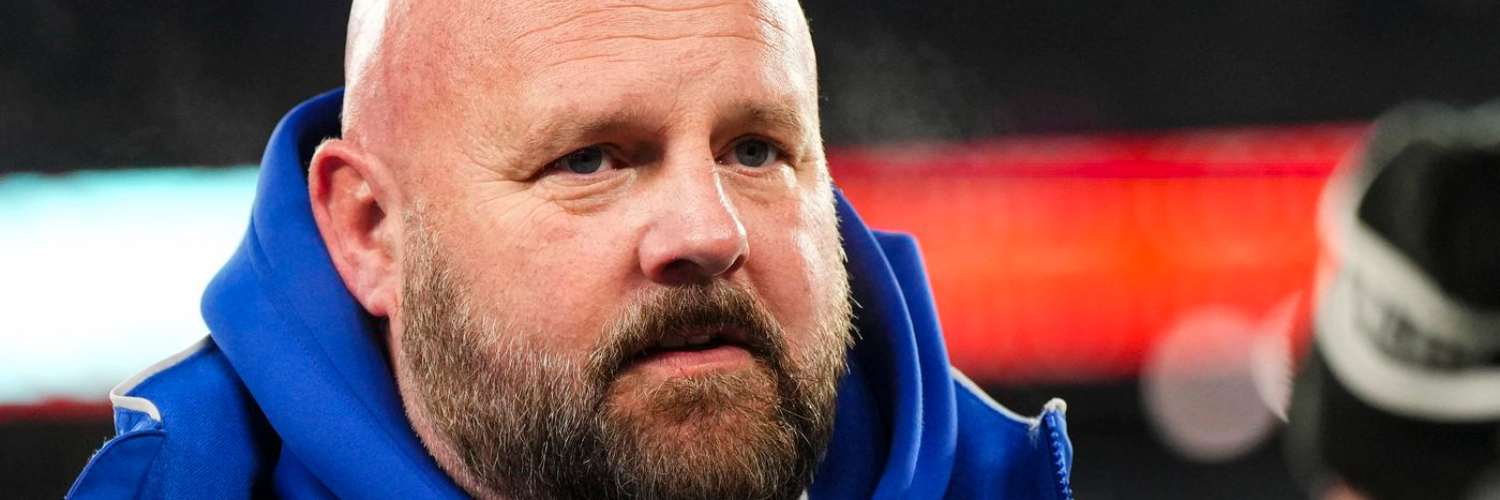Brian Daboll Coaching Profile
Brian Daboll is the current head coach of the New York Giants in the National Football League (NFL). His coaching career highlights include:
- Led the Giants to a playoff appearance in his first season as head coach (2022)
- Named AP NFL Coach of the Year in 2022
- Won AP NFL Assistant Coach of the Year in 2020 as Buffalo Bills offensive coordinator
Brian Daboll Coaching Record
| Years Active | Record | Win % | Playoff Record | Playoff Win % |
|---|---|---|---|---|
| 24 | 211-159-1 | 57.01% | 24-8 | 75.00% |
Head coaching record is 15-18-1 (.456) in total. Regular Season 15-18-1 (.456), Post Season 1-1 (.500)
Coaching Tree
Parents
- Bill Belichick
- Romeo Crennel
- Eric Mangini
- Tony Sparano
- Sean McDermott
Brian Daboll Coaching Style
Brian Daboll’s coaching approach is influenced by his time with the New England Patriots and Alabama Crimson Tide.
His philosophy incorporates several key elements:
- Implementing aspects of the “Patriots Way,” emphasizing personal accountability and team success
- Focusing on consistent improvement and adaptability
- Utilizing a demanding coaching style with high expectations for players and staff
- Emphasizing offensive innovation and quarterback development
Daboll’s coaching style is characterized by:
- A hands-on approach to offensive game-planning and play-calling
- Willingness to adjust strategies based on personnel and game situations
- Direct communication with players and staff, sometimes including tough criticism
- Emphasis on developing young talent, particularly quarterbacks
This approach aims to create a competitive team culture and maximize offensive production, as evidenced by his success with the Buffalo Bills and his first season with the New York Giants.
Coaching Philosophy and Offensive Scheme
Daboll is known for his innovative offensive schemes and ability to adapt to his personnel.
His offensive philosophy includes:
- Utilizing a diverse run game with multiple formations and personnel groupings
- Implementing a passing game that features both short, high-percentage throws and deep shots downfield
- Emphasizing pre-snap motion and shifts to create mismatches and confusion for defenses
- Tailoring game plans to exploit specific weaknesses in opposing defenses
Daboll’s experience coaching tight ends and wide receivers has influenced his offensive designs, often featuring creative uses of these positions in both the passing and running games.
Player Development
Throughout his career, Daboll has demonstrated an ability to develop and maximize the potential of offensive players, particularly quarterbacks:
- Helped Josh Allen develop from a raw prospect into one of the NFL’s top quarterbacks
- Oversaw significant improvements in Daniel Jones’ performance in his first season with the Giants
- Contributed to the development of tight end Rob Gronkowski during his time as tight ends coach with the Patriots
Challenges and Criticism
Despite his successes, Daboll has faced some challenges and criticism:
- His offenses in Cleveland, Miami, and Kansas City struggled to produce consistently
- Some reports suggest his demanding coaching style has led to tension with certain staff members
- The Giants’ offense regressed in his second season as head coach, leading to questions about sustainability of success
RELATED: NEW YORK GIANTS FRANCHISE VALUE
Brian Daboll Coaching Tree
Prior to becoming the head coach of the New York Giants, Brian Daboll gained experience under several notable coaches:
- Served as an assistant under Bill Belichick with the New England Patriots for 11 seasons across two stints
- Worked as offensive coordinator under Romeo Crennel with the Cleveland Browns
- Coached under Eric Mangini with the New York Jets
- Served as offensive coordinator for Tony Sparano with the Miami Dolphins
- Worked as offensive coordinator under Sean McDermott with the Buffalo Bills
Brian Daboll Football Career Timeline
- William & Mary (1997): Volunteer assistant
- Michigan State (1998-1999): Graduate assistant
- New England Patriots (2000-2001): Defensive assistant
- New England Patriots (2002-2006): Wide receivers coach
- New York Jets (2007-2008): Quarterbacks coach
- Cleveland Browns (2009-2010): Offensive coordinator
- Miami Dolphins (2011): Offensive coordinator
- Kansas City Chiefs (2012): Offensive coordinator
- New England Patriots (2013): Offensive assistant
- New England Patriots (2014-2016): Tight ends coach
- Alabama Crimson Tide (2017): Offensive coordinator & quarterbacks coach
- Buffalo Bills (2018-2021): Offensive coordinator
- New York Giants (2022-present): Head coach
Coaching Achievements and Impact
Brian Daboll’s coaching career has been marked by several notable achievements:
- Five-time Super Bowl champion as an assistant coach with the New England Patriots (XXXVI, XXXVIII, XXXIX, XLIX, LI)
- CFP national champion as offensive coordinator with Alabama (2017)
- AP NFL Assistant Coach of the Year (2020) with the Buffalo Bills
- AP NFL Coach of the Year (2022) with the New York Giants
As offensive coordinator of the Buffalo Bills (2018-2021), Daboll played a crucial role in developing quarterback Josh Allen and creating one of the NFL’s most productive offenses. Under his guidance, the Bills’ offense improved significantly:
- In 2020, the Bills finished second in the NFL in total offense and scoring
- Josh Allen set franchise records for passing yards (4,544) and touchdown passes (37) in 2020
In his first season as head coach of the New York Giants (2022), Daboll led a significant turnaround:
- Improved the team’s record from 4-13 in 2021 to 9-7-1 in 2022
- Led the Giants to their first playoff appearance since 2016
- Oversaw improvements in offensive production, including increases in points scored and total yards
Daboll’s Coaching Future
As Brian Daboll continues his tenure with the New York Giants, several factors will be key to his future success:
- Ability to maintain and build upon the offensive improvements shown in his first season
- Continued development of quarterback Daniel Jones and other young offensive talents
- Adaptation to changing personnel and league-wide tactical trends
- Management of staff relationships and team culture
Daboll’s track record of offensive innovation and player development suggests potential for long-term success, but consistency and sustained improvement will be crucial factors in determining his legacy as a head coach in the NFL.

